
Journal of Economic Methodology
Scope & Guideline
Pioneering research in the methodology of economics.
Introduction
Aims and Scopes
- Methodological pluralism:
The journal emphasizes the importance of methodological pluralism in economics, advocating for a variety of approaches and perspectives to better understand complex economic phenomena. - Philosophy of economics:
It engages deeply with the philosophical aspects of economics, exploring foundational questions about rationality, values, and the nature of economic agents. - Interdisciplinary approaches:
The journal encourages interdisciplinary research, drawing on insights from fields such as sociology, psychology, and biology to enrich economic analysis. - Normative and empirical analysis:
It addresses both normative questions (what economics should be) and empirical inquiries (what economics is), creating a dialogue between theory and practice. - Critique of mainstream economics:
The journal often critiques mainstream economic theories, advocating for alternative viewpoints and highlighting the limitations of established paradigms.
Trending and Emerging
- Behavioral economics and welfare:
There is a marked increase in discussions surrounding behavioral economics and its implications for welfare analysis, reflecting a growing recognition of the complexity of human decision-making. - Interdisciplinary influences:
Emerging themes suggest a trend towards interdisciplinary research, particularly incorporating insights from biology, sociology, and psychology to inform economic methodologies. - Normative concepts in economics:
Papers addressing normative empirical concepts are gaining traction, indicating a renewed interest in the ethical and normative dimensions of economic theory and practice. - Critiques of paternalism:
The journal is increasingly publishing works that critique paternalistic approaches in economics, highlighting a broader debate about agency, autonomy, and rationality in economic decision-making. - Complexity and systems thinking:
There is a growing focus on complexity and systems thinking within economic methodology, reflecting an acknowledgment of the interconnectedness of economic systems and the limitations of reductionist approaches.
Declining or Waning
- Formal methods in economics:
There has been a noticeable decline in papers focusing solely on formal methods, suggesting a shift towards more qualitative and interdisciplinary approaches in economic methodology. - Traditional neoclassical models:
The prominence of traditional neoclassical economic models appears to be waning, as the journal increasingly favors discussions around alternative economic theories and methodologies. - Purely theoretical constructs:
There is a decreasing emphasis on purely theoretical constructs without empirical grounding, as the journal seeks to integrate empirical evidence with theoretical discussions.
Similar Journals

ECONOMETRICA
Pioneering rigorous insights in econometrics.ECONOMETRICA, published by Wiley, is a leading journal in the field of economics and econometrics, renowned for its rigorous and cutting-edge research contributions. With an ISSN of 0012-9682 and an E-ISSN of 1468-0262, this esteemed journal holds a prestigious position in the academic landscape, classified in the top quartile (Q1) for both Economics and Econometrics as of 2023, and ranked 42 out of 716 in its field, placing it in the 94th percentile according to Scopus metrics. The journal's scope encompasses a diverse range of topics aimed at advancing economic theory and its practical applications, making it an essential resource for scholars, practitioners, and students alike. Although it operates under a subscription model, the depth and quality of research published in ECONOMETRICA underscore its significance as a cornerstone for intellectual discourse and innovation within the field. Based in the United Kingdom, at 111 River St, Hoboken, NJ 07030-5774, ECONOMETRICA continues to attract high-caliber contributions that shape the future of econometric research.
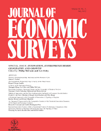
JOURNAL OF ECONOMIC SURVEYS
Pioneering Research in the Heart of Economic TheoryJOURNAL OF ECONOMIC SURVEYS, published by WILEY, is a highly esteemed peer-reviewed journal dedicated to the field of economics and econometrics. With its distinguished position as a Q1 journal and a Scopus rank of #38 out of 716, the journal consistently showcases cutting-edge research that significantly contributes to the understanding and development of economic theories and practices. Since its inception in 1987, this journal has been a cornerstone for economists, providing vital surveys that systematically address contemporary issues and emerging trends within the discipline. Researchers and practitioners alike rely on the journal for its rigorous analysis and comprehensive reviews, making it an essential resource for anyone involved in economic research. Although the journal does not currently offer open access options, its exceptional impact and relevance in the field continue to engage a global audience of scholars and policymakers.

Empirical Economics
Exploring the intersection of data and economic theory.Empirical Economics, published by PHYSICA-VERLAG GMBH & CO in Germany, is an esteemed journal in the field of economics that has been disseminating high-quality research since its inception in 1976. With an impressive convergence of studies that extends to 2024, the journal occupies notable positions within various academic categories, achieving a Q2 ranking in Economics and Econometrics and Statistics and Probability, and a commendable Q1 ranking in Mathematics (miscellaneous) and Social Sciences (miscellaneous) as of 2023. The journal stands out for its interdisciplinary approach, evidenced by its Scopus ranks that place it in the top percentiles across multiple sections, including the 86th percentile in both Mathematics and Social Sciences rankings. While currently not an open access journal, Empirical Economics serves as a pivotal platform for researchers, professionals, and academics seeking to engage with empirical methodologies that drive contemporary economic analysis and policy formulation. Its commitment to disseminating significant findings in the rapidly evolving landscape of empirical economic research makes it a must-read for anyone interested in the interplay between data and economic theory.
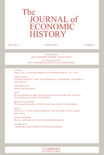
JOURNAL OF ECONOMIC HISTORY
Connecting Historical Contexts to Modern EconomiesJOURNAL OF ECONOMIC HISTORY, published by Cambridge University Press, is a renowned academic platform dedicated to the exploration and analysis of economic history from its inception in 1941 through the forthcoming decades. With its ISSN 0022-0507 and e-ISSN 1471-6372, this journal occupies a prestigious place in the field, as evidenced by its impressive Q1 rankings in both Economics and Econometrics and History categories for 2023. It is positioned among the top tier of journals, ranking #42 out of 1760 in the Arts and Humanities (History) and #75 out of 242 in Economics, Econometrics, and Finance (Miscellaneous) according to Scopus metrics. The journal's rigorous peer-reviewed articles aim to bridge theoretical frameworks with empirical research, fostering an understanding of historical economic dynamics and their relevance in contemporary society. Although the journal does not offer open access, it continues to serve as an essential resource for researchers, professionals, and students aiming to deepen their knowledge and contribute to critical discussions within the fields of economics and history. The journal publishes diverse articles that engage critically with both primary and secondary sources, ensuring that its contributions remain impactful and influential within the academic community.
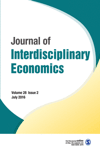
Journal of Interdisciplinary Economics
Empowering Research Across Economic BoundariesThe Journal of Interdisciplinary Economics, published by SAGE Publications India Pvt Ltd, is a distinguished platform for innovative research in the field of economics, promoting interdisciplinary approaches that integrate various economic theories and practices. Founded in 2004, this journal has established itself as a pivotal resource for scholars and professionals, fostering a deeper understanding of economic phenomena through empirical studies, theoretical discussions, and methodological advancements. With an ISSN of 0260-1079 and E-ISSN of 2321-5305, the journal is indexed in Scopus, achieving a commendable Q3 classification in Economics and Econometrics in 2023. As a contributor to a growing body of knowledge, authors will find an audience keen on groundbreaking insights and varied perspectives, making it an excellent venue for disseminating impactful research. Although it operates under a subscription model, the journal ensures that its high-quality content remains accessible to a wider academic community. Researchers, practitioners, and students are encouraged to engage with and contribute to this vital discourse in economic research.

Review of Austrian Economics
Advancing the discourse in Austrian economic thought.Review of Austrian Economics, published by Springer, is a distinguished scholarly journal that plays a pivotal role in the field of economics, particularly focusing on the Austrian School of economic thought. With a rich history spanning from 1987 to 1997 and resuming in 1999 to the present, this journal provides a platform for rigorous research and critical analysis in both theoretical and applied economics. Holding an impressive Q2 classification in 2023, it ranks 124 out of 288 in the General Economics, Econometrics and Finance category, indicating its robust impact within the academic community. Researchers, professionals, and students can benefit from an array of interdisciplinary approaches featured in its articles, which address contemporary economic issues through the lens of Austrian theory. Although not an open-access journal, it continues to foster invaluable discourse that contributes significantly to the advancement of economic thought and policy debates.

American Economic Journal-Applied Economics
Exploring Innovative Methodologies in Applied EconomicsWelcome to the American Economic Journal - Applied Economics, a premier publication in the field of applied economics that strives to provide scholars and practitioners with cutting-edge research and insights. Published by the American Economic Association, this journal ranks in the top quartile (Q1) of Economics, Econometrics, and Finance categories as of 2023, reflecting its significant impact and relevance in the field. With a notable Scopus ranking of #5 out of 288 in General Economics and a distinguished percentile of 98th, this journal serves as a vital resource for advancing knowledge in economic theory and its application to real-world issues. Although not open access, it remains accessible to a broad audience, and welcomes submissions that explore innovative methodologies and empirical analyses that bridge theory and practice. Spanning from 2009 to 2024, the journal not only supports rigorous academic discourse but also plays a crucial role in shaping the discourse around effective economic policy. We invite researchers, professionals, and students in the field to engage with the high-quality work published within these pages.
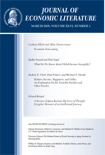
JOURNAL OF ECONOMIC LITERATURE
Exploring the depths of economic thought and theory.JOURNAL OF ECONOMIC LITERATURE, published by the American Economic Association, stands as a premier academic journal in the field of economics, with a notable Q1 classification in Economics and Econometrics for 2023. Operating from its base in Nashville, TN, this journal has established itself as an indispensable resource for economic researchers and practitioners alike, boasting an impressive Scopus ranking of 10 out of 716—placing it in the top 2% of its category. The journal's commitment to providing comprehensive critical surveys of the literature enhances the understanding of various economic topics, making it a vital tool for researchers seeking to deepen their knowledge or explore new areas of inquiry. Although it operates on a subscription basis, the journal’s high impact on the economics community underlines its importance in advancing the field. With coverage spanning from the 1980s to the present, JOURNAL OF ECONOMIC LITERATURE continues to encourage rigorous scholarship and bridge theoretical and empirical research, enabling informed discourse among economists globally.

CAMBRIDGE JOURNAL OF ECONOMICS
Navigating the Complexities of Economic ThoughtCambridge Journal of Economics, published by Oxford University Press, is a premier academic journal in the field of economic theory, policy, and applications, catering to researchers, professionals, and students alike. With a rich history dating back to 1977, this journal has established itself as a notable contributor to critical discourse in the arena of Economics and Econometrics. With an impressive Scopus ranking of #210 out of 716 in its category, placing it in the 70th percentile, the journal maintains a solid Q2 classification, reflecting its significant impact and contribution to the field. Although it operates on a subscription basis, the Cambridge Journal of Economics is accessible through a range of academic databases and libraries, ensuring that its high-quality research reaches a wide audience. The journal aims to advance the understanding and application of economic principles, making it an essential resource for anyone looking to deepen their knowledge or stay updated with the latest research trends in economics.
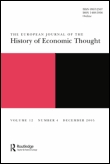
European Journal of the History of Economic Thought
Fostering Insightful Scholarship in Economic HistoryThe European Journal of the History of Economic Thought, published by Routledge Journals, Taylor & Francis Ltd, stands as a pivotal platform for scholars in the interdisciplinary fields of economics, history, and philosophy. With its ISSN 0967-2567 and E-ISSN 1469-5936, this esteemed journal is not only recognized for its Q2 ranking in various categories, including Arts and Humanities and Economics, but it also boasts an impressive HIndex indicating a significant level of academic influence and engagement. With published works spanning from 1993 to 2024, this journal seeks to illuminate the historical context and evolution of economic thought, promoting critical discourse among researchers, professionals, and students alike. Although it does not currently offer open access, the journal remains a crucial resource for those wishing to delve into the intricate relationships between economic theory and historical progression. By fostering a deeper understanding of economic ideas and their implications, the European Journal of the History of Economic Thought plays a vital role in enhancing the scholarship within its domain.